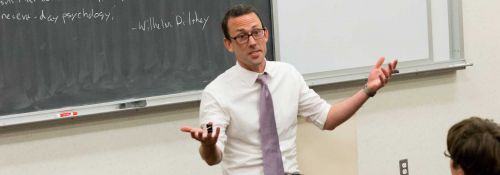
Is ‘Better Science’ Really the Answer for Social Sciences?
Written by Madeleine Jepsen
The Denial of Death, a book by cultural anthropologist Ernest Becker, proposes that the foundation for human motivation and achievement is a terror of one’s own mortality. This idea, better known as terror management theory, is the subject of hundreds of studies in the field of social psychology. According to Assistant Professor of Psychology Collin Barnes, this experimentation is not only misplaced, but demonstrates a larger issue in the field.
“If you look on the cover of this book, it is the winner of the Pulitzer Prize,” Dr. Barnes said. “That, to me, says that many, many people—important people, reputable people—read this book and saw in it the human experience. And yet, for social psychologists, this isn’t good enough; this isn’t evidence of the truth of this.”
Recently, studies that attempted to replicate the results of previous research in social psychology, a field that deals with social interactions and their effect on the individual, found that nearly one-in-four studies were unable to be reproduced. So far, most proposed solutions for the reproducibility crisis focus on methodology: better procedure, better training in statistics, and better project design. From Dr. Barnes’s perspective, the field of social psychology may be best off using the so-called reproducibility crisis as a point for reflecting on the purpose of the field.
“Honesty, openness, curiosity: these are the kinds of characteristics, or even virtues, that are definitive of the best scientific minds that peer into a reality that’s sort of behind a screen of appearances,” Dr. Barnes said, citing examples of thinkers such as Carl Rogers, Sigmund Freud, and Abraham Maslow, who did not confine clinical observations to numeric or scientific methodology. “So there’s this vibrancy, and source of potential, I think, in not being so wedded to experimentation and measurement that opens the door to all kinds of possibilities.”
Dr. Barnes distinguished between social psychology and the subfields of psychology that are well-suited for the natural science method. These include domains that deal with sensation and perception, which are tied to biological processes. However, in social psychology, which transcends the natural sciences, Dr. Barnes said the process of understanding is more important than replication.
“When we’re talking about higher-level human achievements and so forth—and by that I mean things like love, insight, creativity, ingenuity, honesty, religious commitment, martyrdom—these are the kinds of things where I believe the methodology needs to give way to something else, in which replication isn’t as heavy a burden,” he explained. “Understanding becomes the bigger burden.”
Understanding, which moves beyond the terms of prediction and control of a science experiment, would allow for social psychologists to examine concepts and ideas such as relationships, which can’t be ascertained from chemical or biological analysis.
“You actually get the prediction and control, but it’s not the goal. It’s sort of a byproduct. I would be willing to put someone who has that deep understanding of another person up against the predictions of a social psychologist any day,” Dr. Barnes said. “I think they would be right. I think the social psychologist would be fumbling.”
In this sense, social psychology and the reproducibility crisis reflect broader issues concerning the relationship between the modern discipline of psychology and older disciplines.
“An emphasis on understanding, an emphasis on the spirit of science, both of those things open up the discipline to the humanities,” Dr. Barnes explained. “Suddenly, I’m not over here with my science club saying, ‘Well, here, let me test your hypothesis and see if you have an insight.’ Suddenly I’m being informed by humanities, in a way.”
As the field of social psychology (and psychology as a whole) continues to grow and change, Dr. Barnes said he hopes his colleagues in the field will develop an openness to ways of knowing outside of science.
“These are really important questions that it can take time to see manifest, but I would say that the orientation is there,” he said. “You don’t turn an ocean liner around overnight, right?”
Madeleine Jepsen, ‘18, studies biochemistry and journalism. Outside the classroom, Madeleine serves as a reporter and assistant editor for the Collegian. She is also involved in Catholic Society.